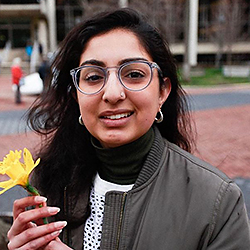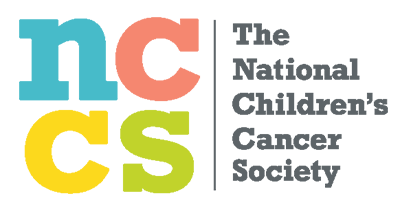Meet Farah Contractor

Years Awarded:
2018-2019
"My cancer experience is essential to me; it has taught me that the light at the end of the tunnel is attainable as long as I keep my head up and my hand out always reaching."
If there is one thing I learned from being a cancer patient it is that people metaphors. “You can win this battle” or “kick cancer’s butt” are some of the more hackneyed phrases I am accustomed to hearing. There was one saying in particular that stuck out to me: “There is light at the end of the tunnel.” This analogy of my situation got me thinking about what I would do with that light after I reached it. One day, on the third floor of Children’s Hospital of Philadelphia, a thirteen year-old Farah Contractor decided to become a pediatric oncologist.
The concept of the light at the end of the tunnel became very concrete for me. The thought of my future is what propelled me through my treatment for non-Hodgkin’s lymphoma. Instead of just researching my disease, I scoured the Internet for the best pre-med and medical schools. I also made school my number one focus and my security blanket while I dealt with the side effects of cancer treatment. It was the perfect distraction from the toxins being pushed thrugh my veins.
After seven months, the tumor cells had disappeared and the light of my future was imminent. I transitioned into eighth grade with ease that my teachers attributed to my stubbornness in worrying about school more than my health. However, I was not solely focused on my juvenile years at middle school, but where those years would take me. Yet, in the middle of eighth grade, I saw the coveted light recede as I was diagnosed with secondary acute myeloid leukemia, which was caused by the chemotherapy from my prior treatments. Not only was my blood betraying me again, but the very drugs that granted me remission failed me as well.
I spent most days of the next seven months in a foggy haze of narcotics where Purell was my signature fragrance and surgical masks were fashionable. My immune system refused to defend me and, as a result, I became the poster child of what could go wrong during chemotherapy. My hopes were starting to dwindle when I contracted shingles, which caused me to have facial paralysis and lose hearing in my right ear. I can recall looking in the mirror and feeling revolted by my new lopsided smile. I remember seeing my parents’ and doctors’ faces disclose their doubtful thoughts when my heart started failing. I finally understood the severity of my situation when my doctor told me I could never be fertile. I began to believe that this light I envisioned was just a mirage at the end of an eternal hole. Nevertheless, there was little part of me that held on to that light, my future.
That little part of me grasped something true because I was able to receive a bone marrow transplant and, at last, connect with the light that had become intangible. And am I certainly basking in it now. I am able to look in the mirror and smile my lopsided smile, proud of the story behind it.
After completing my second cancer treatment, my outlook on life changed considerably, and I knew I had to be the change I wanted to see in the world. I realized that my interest in becoming a doctor had become a passion. I was pursuing my dream for the right reason and to do that I had to be a leader, not a follower. I began to get involved in extracurricular activities that really mattered to me. I started volunteering at Gilda’s Club, a cancer support community. I helped to organize Mini-THON at my school, and I was a keynote speaker. I even started my own club at my high school called the Childhood Cancer Awareness Club. We raise about one thousand dollars each year to buy supplies to make fifty blankets for cancer patients at CHOP. My experience with cancer made me realize that if I want to raise awareness for this cause, I have to take charge. I cannot sit back and expect it to happen on its own; I have to be the leader.
Not only did my outlook on life change, but my lifestyle itself transformed. I changed my diet dramatically by becoming a vegan because I had read studies about the correlation between animal-product consumption and increased cancer risk. After recovering from cancer treatment, I knew I had to avoid anything carcinogenic. My constant research showed that certain foods elevated the risk of cancer almost as much as smoking did. I even helped my family start to eat healthier by replacing processed foods with whole, nutritious foods.
After becoming vegan, my eyes opened to a whole new field of study: nutrition. I definitely want to make nutrition part of my career. Also, I would like to pursue further research about the connection between diet and cancer risk in the future.
Today, I use my cancer experiences as motivation and strength to guide me through life. Someday, I hope that they will impact and shape others’ lives. My cancer experience is essential to me; it has taught me that the light at the end of the tunnel is attainable as long as I keep my head up and my hand out always reaching.
